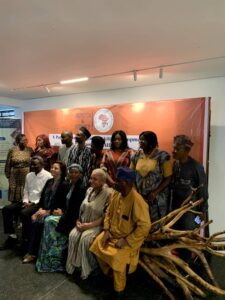By: Tijani Salako.
At the official launching of the Pan-African Indigenous Skills Development Programme (PAID) in Lagos, at Soto gallery, stakeholders from academia, cultural institutions, and foreign embassies have establish the need to reimagine smart home development in Africa including Nigeria through the lens of indigenous knowledge and cultural identity.
The PAID initiative, jointly facilitated by the Centre for Black and African Arts and Civilization (CBAAC) and its European partners under the EU’s Spaces of Culture Programme, aims to blend African heritage with innovation including how homes are built and lived in with the essence of reconnecting the ancient time with this digital world.
Speaking at the event, Dr Akin Akinmayo from the University of Lagos, Institute of African and Diaspora studies, while responding to the participants question raised on how essentially it is to integrate the African heritage into the smart homes design and incorporating traditional African values

Dr Akinmayo noted that “It’s not about importing Italian tiles or copying foreign designs. It’s how we build for extended family systems, how our homes reflect communal living and openness to nature, as African homes often shift beyond aesthetics to embody values, tree spaces for storytelling, windows for natural ventilation, open courtyards, and architectural forms that encourage family bonding and cultural continuity.
Also expanding on the theme, Hajia Aisha Adamu, Director-General of CBAAC, emphasised that the PAID programme is not simply about physical construction but about reawakening memories, identity, and sustainability in design thinking. We’re not just documenting knowledge; we want to inspire innovation rooted in tradition from the layout of our homes to the materials we use.
According to her, one of the programme’s goals is to train participants across Nigeria’s 36 states and the FCT in “African Creative Design Thinking.” which includes application of indigenous architectural concepts to contemporary buildings, such as rural development, environmental sustainability, and smart housing all while preserving cultural heritage.
Also, Mrs. Aduke Gomez, a representative of Ireland embassy described the initiative as a celebration of embedded wisdom in African building systems. Sharing her insight from traveling along Ile-Ife route, she said the use of centuries-old terracotta flooring made from broken is a technique that is both beautiful and sustainable. These are techniques that contemporary material designers would love to adapt into modern buildings it’s local, affordable, and climate-friendly,” she noted.
She further pointed that cross-cultural architectural exchange is a core focus pointing out similarities in traditional structures between Africa and Ireland particularly in the use of clay-based materials and highlighted the potential for mutual learning in sustainable building practices, this isn’t just about preserving the past. It’s about creating platforms for new design conversations between Africa and the rest of the world.
Dr Nadine Siegert, Director of Goethe institute and President European Union National Institutes of Culture, also re-echo that architectural design can serve as a living archive of African wisdom. From the fabrics we use to furniture, to wall hangings and floor designs every element should tell a story. And we must ensure that these traditions are not lost or appropriated by others who may not even understand their meanings.
The DG of CBAAC concluded with a call for innovation that includes young creatives: “We want to see our traditions reflected in the digital age. Why can’t our indigenous languages appear in smart home interfaces? Why can’t traditional symbols inspire tech design, smart homes should not be sterile or Western clones. They should reflect who we are.
She added that as the PAID project kicks off, the pilot phase will involve community-based workshops where participants gather stories, architectural techniques, and ancestral knowledge from their local environments. These insights will inform home design that balances modern technology with African identity paving the way for a new era of culturally intelligent housing across the continent.